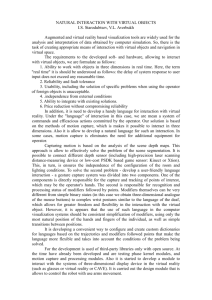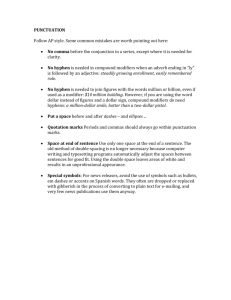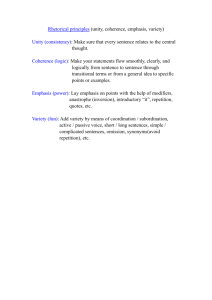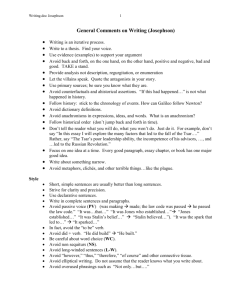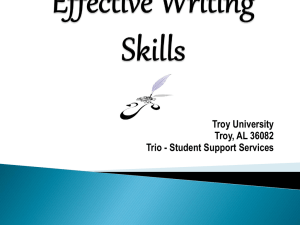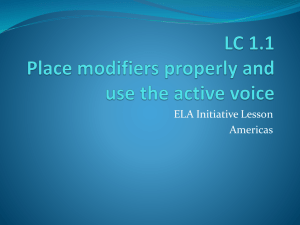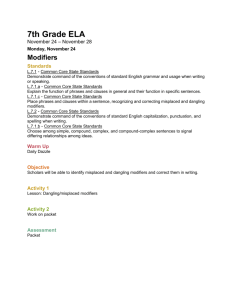Sentence Modifiers
advertisement
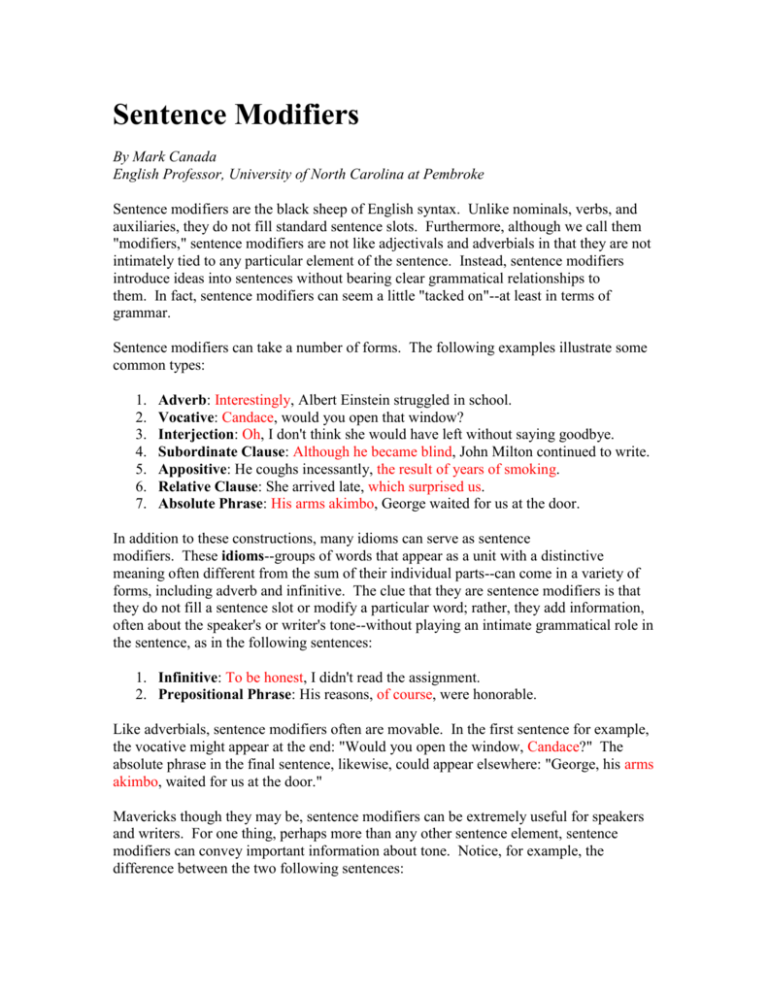
Sentence Modifiers By Mark Canada English Professor, University of North Carolina at Pembroke Sentence modifiers are the black sheep of English syntax. Unlike nominals, verbs, and auxiliaries, they do not fill standard sentence slots. Furthermore, although we call them "modifiers," sentence modifiers are not like adjectivals and adverbials in that they are not intimately tied to any particular element of the sentence. Instead, sentence modifiers introduce ideas into sentences without bearing clear grammatical relationships to them. In fact, sentence modifiers can seem a little "tacked on"--at least in terms of grammar. Sentence modifiers can take a number of forms. The following examples illustrate some common types: 1. 2. 3. 4. 5. 6. 7. Adverb: Interestingly, Albert Einstein struggled in school. Vocative: Candace, would you open that window? Interjection: Oh, I don't think she would have left without saying goodbye. Subordinate Clause: Although he became blind, John Milton continued to write. Appositive: He coughs incessantly, the result of years of smoking. Relative Clause: She arrived late, which surprised us. Absolute Phrase: His arms akimbo, George waited for us at the door. In addition to these constructions, many idioms can serve as sentence modifiers. These idioms--groups of words that appear as a unit with a distinctive meaning often different from the sum of their individual parts--can come in a variety of forms, including adverb and infinitive. The clue that they are sentence modifiers is that they do not fill a sentence slot or modify a particular word; rather, they add information, often about the speaker's or writer's tone--without playing an intimate grammatical role in the sentence, as in the following sentences: 1. Infinitive: To be honest, I didn't read the assignment. 2. Prepositional Phrase: His reasons, of course, were honorable. Like adverbials, sentence modifiers often are movable. In the first sentence for example, the vocative might appear at the end: "Would you open the window, Candace?" The absolute phrase in the final sentence, likewise, could appear elsewhere: "George, his arms akimbo, waited for us at the door." Mavericks though they may be, sentence modifiers can be extremely useful for speakers and writers. For one thing, perhaps more than any other sentence element, sentence modifiers can convey important information about tone. Notice, for example, the difference between the two following sentences: 1. Mom, please give me a cookie. 2. Give me a cookie. In the former sentence, the vocative Mom and the interjection please soften the request-and probably increase the chances that a treat will be forthcoming. Sentence modifiers do not always have a positive effect, however. Parents, for example, are notorious for using their children's middle names in vocatives when they are particularly upset, as in the following sentence: "Jordan Lee, get over here now!" Of course, the speaker's intonation will help to convey emotional information, as well. As Martha Kolln and Robert Funk note in Understanding English Grammar, some sentence modifiers also can help focus the audience's attention, as in the following sentences: 1. Her laundry piled nearly to the ceiling, Marnie welcomed her parents to her dorm room. 2. The girl raced into the room, her face beaming. Kolln and Funk liken the effect of these absolute phrases to close-ups in movies. Finally, because they often are separated from the rest of the sentence by one or two pauses, sentence modifiers can help speakers and writers alter the rhythm of their prose. Exercises General A. Identify the sentence modifiers in the following sentences. Label their type. 1. 2. 3. 4. 5. 6. 7. To my mind, Jane, you are the best candidate. Cookie crumbs all over her lap, the girl turned down the salad. Why, you didn't tell me you graduated from Indiana University! Now, you said you were a biologist, which surprises me. If you must know, I'm 34. Tell me if you finish before time is up. His average at .352, two points above his nearest competitor, the hitter sat out the last game of the season, a move that surprised no one. 8. Really, Laura, you should have told me, even if you were embarrassed. 9. I'm sorry, by the way, for throwing away your dissertation. B. Add as many sentence modifiers as you can to the following sentence: "Go to college." Editing C. Make the following sentences conform to the conventions of Standard Written English: 1. 2. 3. 4. 5. 6. 7. Well Don it's time for us to go. If he knew her he didn't let on. The pilot ironically takes a train whenever he travels. While driving home a deer nearly struck his car. He painted her because he loved her. Boy you really know your way around here Lucy. Although it has attracted a lot of attention the program lost money. Style D. The next time you are reading a newspaper article, novel, or other form of communication, make a note of the sentence modifiers you see. How common are they? How do they affect the meaning or impact of the sentences in which they appear? Try taking out some of the sentence modifiers. Do the sentences feel any different? Explain.
